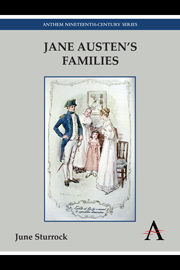Book contents
- Frontmatter
- Table of Contents
- Acknowledgements
- References and Abbreviations
- General Introduction
- Part I Family Dynamics
- Part II Fathers and Daughters
- Introduction
- Chapter Four Money, Morals and Mansfield Park
- Chapter Five Speech and Silence in Emma
- Chapter Six Dandies and Beauties: The Issue of Good Looks in Persuasion
- Conclusion: “Creative Attention”
- Notes
- Select Bibliography
- Index
Chapter Six - Dandies and Beauties: The Issue of Good Looks in Persuasion
from Part II - Fathers and Daughters
- Frontmatter
- Table of Contents
- Acknowledgements
- References and Abbreviations
- General Introduction
- Part I Family Dynamics
- Part II Fathers and Daughters
- Introduction
- Chapter Four Money, Morals and Mansfield Park
- Chapter Five Speech and Silence in Emma
- Chapter Six Dandies and Beauties: The Issue of Good Looks in Persuasion
- Conclusion: “Creative Attention”
- Notes
- Select Bibliography
- Index
Summary
By the end of Mansfield Park Fanny Price has formed a strong mutual attachment with Sir Thomas Bertram and after her marriage they continue to seek each other's company. The possibility of leaving her father to marry Mr Knightley greatly distresses Emma and eventually she and her husband make their home with Mr Woodhouse. Anne Elliot's relationship with her father is very different: any grief she feels over her marriage to Captain Wentworth, a marriage that could take her right away from her family, results from her knowledge that she has “no relations to bestow on him which a man of sense could value” (257). She offers her father the conventional courtesy and external respect required of a dependent daughter by custom and the fifth commandment without feeling obliged to respond to his wishes or share his values. Christine Gibbs says of Anne,
her mind and opinions are all her own, and when she quietly ignores her father's disapproval of her visits to her impoverished school friend Mrs Smith, Jane Austen makes it clear that the disobedience is morally justified and that it is Sir Walter whose morals are unsound. (49)
She is “ashamed” at his toadying to Lady Dalrymple and finds the heartless elegance of her father and sister “mortifying” (120). Her idea of good company – “clever, well-informed people who have a great deal of conversation” (171) – is remote from Sir Walter's concern with social rank and physical appearance.
- Type
- Chapter
- Information
- Jane Austen's Families , pp. 99 - 110Publisher: Anthem PressPrint publication year: 2013

